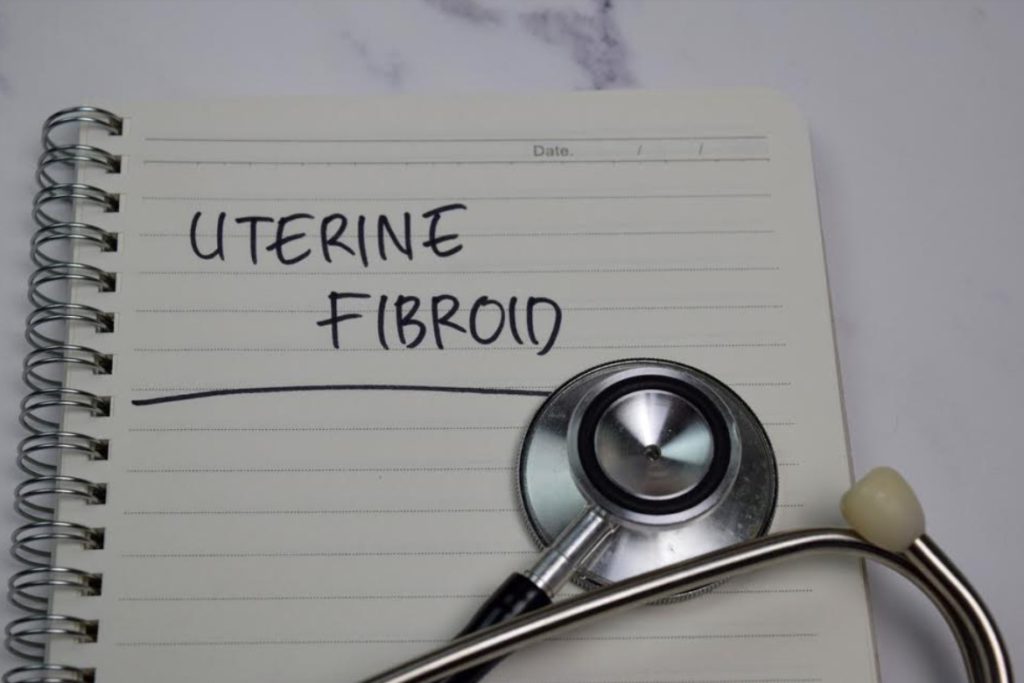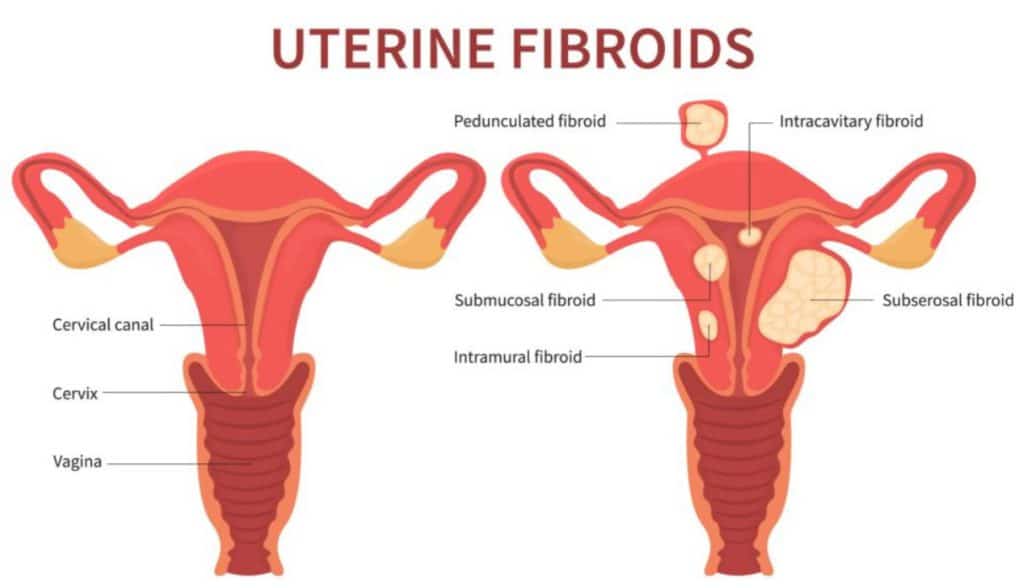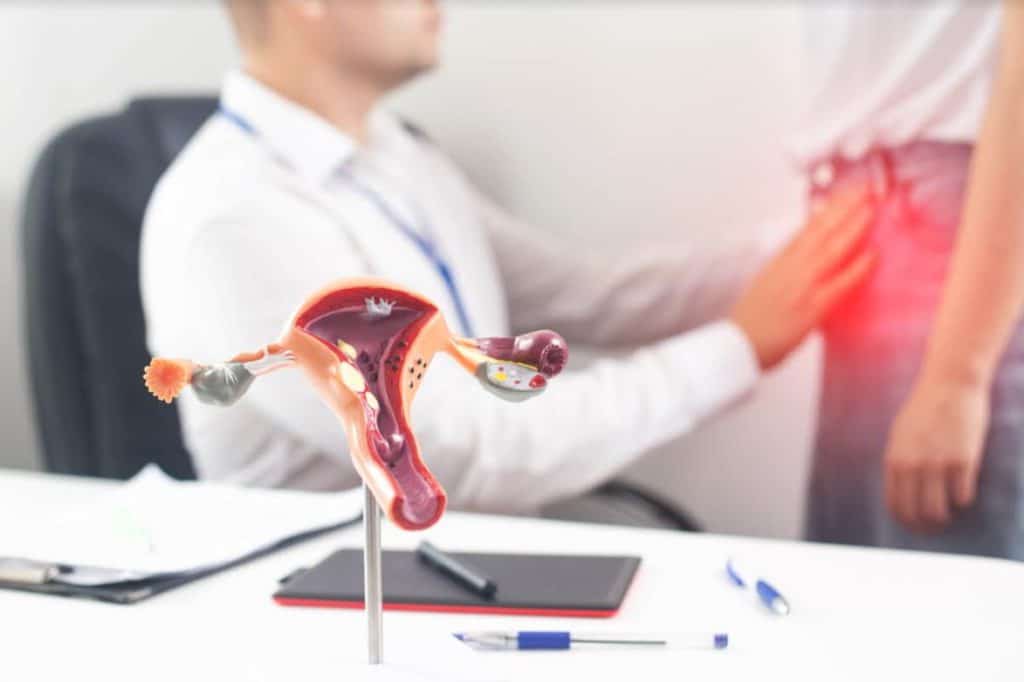About 8 in every 10 women would have had a fibroid before the age of 50. This fact is according to a detailed study conducted in 2020 on the causes and distribution of fibroids. These fibroids are noncancerous, or benign, tumors that develop from uterine muscles and other tissues in the body. Now, the question is: Can fibroids cause infertility and affect your chances of getting pregnant?
In this post, you’ll learn what fibroids are, the various types, their relationship with infertility, and how it affects your chances of getting pregnant.

First, What Are Fibroids?
As we discovered earlier, fibroids are common growths or tumors which develop in the uterus from uterine muscles and other tissues. In most cases, these abnormal growths are generally painless, harmless, and rarely lead to uterine cancer.
These uterine fibroids vary in size, number, and location. Interestingly, a woman may have a single fibroid or multiple ones in a lifetime. As a result, fibroids can change both the size and shape of the uterus. These variations also serve as the basis for the classification of fibroids into various types.
Types of Fibroids
Fibroids are classified into various types depending on their location. Based on this factor, there are three main types of fibroids:
- Subserosal: These fibroids grow on the external wall of the uterus and may continue to grow outwards as they increase in size.
- Intramural: These fibroids develop inside the uterine wall. As they expand, intramural fibroids also cause the uterus to become larger than normal.
- Submucosal: Submucosal fibroids are located in the inner lining of the uterus and may extend into the uterine cavity as they grow larger. This type of fibroid has a relationship with infertility.

In addition to these, it is also possible to classify uterine fibroids into a fourth, and less common, type:
- Pedunculated: These fibroids attach to the uterine wall with a stem-like growth referred to as a peduncle. The unique feature of this type of fibroid is the presence of this stem or peduncle.
Although fibroids are generally harmless and painless for most people, the type and size of a fibroid often determine the symptoms it presents with.
In the next part of this article, you will discover the major signs and symptoms of fibroids.
Signs and Symptoms of Fibroids
It is possible to have fibroids and remain completely unaware of them.
This is because these growths, although abnormal, are generally harmless and do not necessarily cause any obvious symptoms. In addition, the symptoms associated with fibroids are dependent on the location, size, and the number of growths.

However, women with uterine fibroids may experience one or some of the following:
- Heavy menstrual flow
- Irregular and over-extended periods
- Pelvic pain
- Frequent urination
- Lower back pain
- Constipation
Do Fibroids Cause Infertility?
If you pay close attention to the signs and symptoms of fibroids mentioned earlier, you’d realize that there is no mention of infertility. This is because only 1% – 3% of all infertility cases are caused by the presence of fibroids.
In fact, most women with uterine fibroids will not be infertile.
Furthermore, data retrieved from the American Society for Reproductive Medicine shows that less than 10% of women trying to conceive actually have fibroids.
Nevertheless, fibroids can affect your chances of getting pregnant in various ways, depending on the location, size, and type. This is because certain fibroids may be located in positions that block the fallopian tube or prevent implantation (pregnancy) by altering the shape of the uterus. As a result, large fibroids (usually above 4cm) are often associated with lower conception and pregnancy rates.
Fibroids only affect pregnancy and cause infertility if:
- The fibroids block the uterine tubes
- There are major changes in the shape of the cervix
- The uterine fibroids prevent the movement of sperm into the uterus.
- It causes the uterine lining loses a significant amount of its thickness.
- The fibroids reduce the blood flow getting to the uterine cavity.
Furthermore, fibroids have no effect on ovulation. However, they may make it more difficult for your uterus to support conception and see a pregnancy to term. Therefore, women with fibroids who are trying to conceive are advised to monitor the growth closely and work with their doctors to develop an effective treatment plan.
Other Causes of Infertility
As we mentioned earlier, uterine fibroids alone rarely affect pregnancy. That is, there’s only a very slim chance of uterine fibroids being a standalone cause of infertility.
Nonetheless, women with uterine fibroids may be affected by other factors that largely cause infertility. Some of these other causes of infertility include:
- Anovulation or failure to ovulate
- Endometriosis
- Polycystic Ovary Syndrome (PCOS)
- Sexually Transmitted Infections
- Autoimmune diseases, like rheumatoid arthritis
- Uterine abnormalities, like damaged fallopian tubes
- Unknown factors
Treating Fibroids and Infertility
Although most people believe that removing or treating fibroids would improve their chances of getting pregnant, this is not always the case.
The fact is: women with uterine fibroids can still become pregnant without treatment.
If you’ve been diagnosed with uterine fibroids and you are trying to conceive, the first step is to book an appointment with your gynecologist for a proper fertility check to determine the main cause of infertility and determine the best treatment plan for you.
If the doctors determine that fibroids are the main cause of infertility, the next step would be treatment or removal. Treatment options for uterine fibroids include:
- Hormonal medications that work to shrink the fibroids
- Surgical procedures that serve to completely remove the growths.
Summary
In conclusion, it helps to remember that fibroids are common and in most cases, they do not cause infertility or affect your ability to get pregnant. However, if you have large, many, or submucosal fibroids, they may negatively influence fertility.
If you’re experiencing any of the symptoms mentioned above, please consult your doctor for a proper examination and diagnosis. With the right treatment plan and proper medical care, you’re going to get all you desire.
You Don’t Have to Worry.
References
- Giuliani E, As-Sanie S, Marsh EE. Epidemiology and management of uterine fibroids. Int J Gynaecol Obstet. 2020;149(1):3-9. doi:10.1002/ijgo.13102
- American Society for Reproductive Medicine. Fibroids and fertility.

